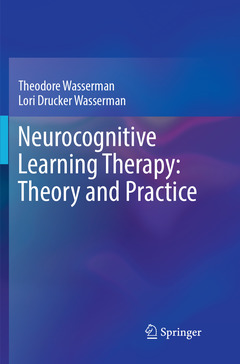Description
Neurocognitive Learning Therapy: Theory and Practice, 1st ed. 2017
Authors: Wasserman Theodore, Wasserman Lori Drucker
Language: English
Subjects for Neurocognitive Learning Therapy: Theory and Practice:
Keywords
Neurocognitive learning therapy; Cognitive behavior therapy; Learning theory; Neuropsychology of mental health; Attention deficit hyperactivity disorder; Obsessive compulsive disorder; Motivation disorder; Treatment engagement; Disorders of arousal; Disorders of motivation; Disorders of engagement; Disorders of inhibition and modulation; Disorders of initiation and impulsivity; Problems with using the DSM in the diagnosis of mental illness; NIMH Research Domain Initiative (RDoC); Psychological effects of dysp
Approximative price 84.39 €
In Print (Delivery period: 15 days).
Add to cartPublication date: 09-2018
Support: Print on demand
84.39 €
In Print (Delivery period: 15 days).
Add to cartPublication date: 08-2017
Support: Print on demand
Description
/li>Contents
/li>Biography
/li>Comment
/li>
This groundbreaking volume introduces the theoretical base and clinical methods of Neurocognitive Learning Therapy, an integrative framework for client-centered intervention. The model unifies psychology and neuroscience in revisiting the connections between brain and behavior, replacing the cognitive-versus-affective binary traditional to clinical thinking with a scenario of the cognitive and emotional learning processes that work together to shape adaptive and pathological behavior. This foundation in learning theory illuminates the therapeutic relationship, synching how therapists teach with how clients learn, with guidelines for educating to encourage change. The unique flexibility of the NCLT model allows practitioners across clinical orientations the freedom to apply eclectic intervention strategies that fit clients? learning styles and therapeutic needs.
Included in the coverage:
- Neurocognitive Learning Therapy and Life Course Theory.
- Reward recognition in Neurocognitive Learning Therapy.
- Memory reconsolidation and Neurocognitive Learning Therapy.
- How to be an NCLT therapist.
- Neurocognitive Learning Therapy clinical procedures.
- Treating children with Neurocognitive Learning Therapy.
- Plus practice handouts and forms for therapists and patients.
Neuropsychologists, child and school psychologists, and social workers will welcome Neurocognitive Learning Therapy not only as a source of theoretical insight into the brain and behavior, but also as an innovative system for enhancing their capacity for therapeutic teaching and their clients? capacity for learning.
Provides theoretical and scientific basis for a new practice model
Teaches practitioners to use several approaches in a scientifically verifiable process
Meets the NIH RDoC criteria for advancing research into new conceptualizations of mental health
Includes supplementary material: sn.pub/extras




